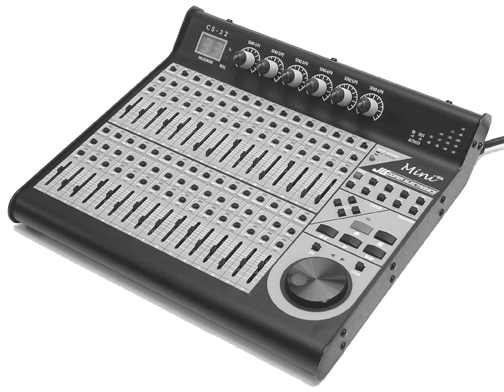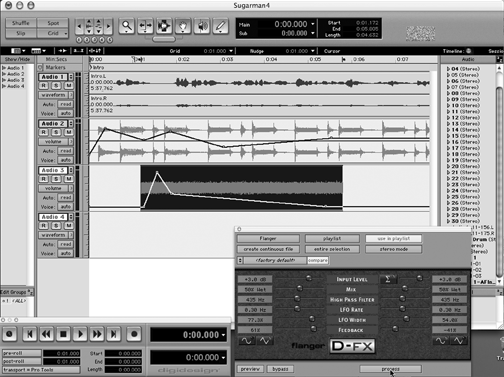
THE CS-32 MINI DESK
JLCooper is well known for making physical controllers that add real knobs and faders to digital editors. Their latest creation is ingenious, powerful, and well, cute. Terminally cute.
I happened by the JLCooper booth at the last AES show in Los Angeles, and there on the table was the new CS-32 MiniDesk. Without thinking I blurted three words out loud — “Send me one!” This little devil packs 32 faders, six knobs, transport controls, an LED display, and a total of 110 buttons into a package that is about nine inches square, and an inch high. It’s just a little wider that a multi line business phone, and comprises a complete set of controls for ProTools.
The top panel is absolutely covered with little faders and buttons. Specifically, there are thirty-two 25mm faders, each of which is associated with three small buttons. A red mode button at the upper right allows each trio of switches to operate as a mute, solo, and pan select in one position, and as a track arm, track select, and locate button in the other.
The right side of the MiniDesk is dominated by the Jog/Shuttle wheel and the transport controls. Two buttons above the wheel determine whether it operates in jog or in shuttle mode. Although it’s small, the wheel is metal and has a nice solid feel to it and no slop.
Above the five transport buttons are four cursor buttons arranged in a diamond pattern. These let you move between regions horizontally and vertically between tracks in ProTools. Above these are nine function buttons and a tenth that acts as a Shift key. These will perform whatever F-key functions work in your editor. In ProTools, the F-keys select the various Tools and Modes like Shuffle and Slip. These work as advertised.
The angled top panel is home to a two-digit LED display and two LED “null” arrows, along with six knobs and an LED data activity indicator. The two-digit LED display shows you what “mode” the MiniDesk is currently using. For example, when you press the Scrub button to use the Jog wheel, the display shows “SC,” while changing to the Shuttle mode causes the display to read “SH.”
The Null indicators provide a quick way to make the physical channel faders on the MiniDesk line up with the onscreen faders, which may differ. For example, if channel 4 on the MiniDesk is all the way down and channel 4 on ProTool’s onscreen mixer is up, the null arrow that points up will light, telling you how to move the physical fader to make it match the current ProTools position. As you do that, the LED display will show you the current fader value in numbers from 0 to 99 as a reference.
The six knobs are labeled Pan and Send A through Send E. These correspond to the Pan control and Sends in ProTools for whichever channel you’ve hit the Pan Select button on the MiniDesk. Trust me, all of the above is much harder to describe than it is to perform. Besides, it’s terminally cute, remember?
The MiniDesk is available in three flavors: a USB version, a MIDI version, and an RS-232 version. I opted for the MIDI version, which requires a MIDI interface between the computer and the MiniDesk. I chose MIDI because I already have way too many USB devices hooked to my computers, but most folks will opt for the USB version. Like the Mbox, the MiniDesk can be powered by your computer’s USB port, or through a powered hub. It supports all Windows versions except for NT and 3.x, and supports Macs running OS9 or OSX.
The MiniDesk is not a ProTools-only device — far from it. According to the company, the USB version also works with Digigram’s X-Track; Steinberg’s Nuendo, Cubase SX and VST; Propellerhead’s Reason; MOTU’s Digital Performer; Soundscape’s REd; Cakewalk Pro Audio and Sonar; Sonic Foundry’s Acid, Sound Forge and Vegas; Abelton Live; Merging Technologies’ Pyramix; and Logic Audio. The MIDI version works with any software that accepts MIDI commands (my next project is to map it to work with Cool Edit Pro... I don’t yet see why not).
The MiniDesk is also not a ProControl. It is very small, and takes some getting used to. But my hat’s off to JLCooper for including darn near every common function on it. The transport section is first-rate and easy to use, despite its small size. The faders and associated buttons are somewhat tougher to get around on, but for basic meatball spot and promo mixing they’re just fine. My only quibble is the small power switch on the back — it took me 15 minutes to figure out why the MiniDesk wouldn’t light up. JLCooper now says they’ll ship the unit with the switch in the ON position. Uh, okay.

TAKING THE ACT ON THE ROAD
Recently I was hired to record a roundtable discussion, held in a hotel conference room, with PD’s from both small and large markets in attendance. What a perfect opportunity to torture-test this mobile ProTools rig! I put up a couple of PZM microphones, plugged them into the Mbox, and connected that to a Titanium Powerbook with OSX and ProTools 6 on it. The internal hard disk in the Powerbook would be more than sufficient, and I brought a little USB MIDI interface to connect the MiniDesk (unnecessary for the USB version). The entire rig fit into a standard Targus computer bag. Sweet.
The discussion lasted for over three hours, but then we are talking Production Directors here (it’s a joke, really, just kidding). Not only did ProTools 6 run without a hitch during the entire session, but when it was over I actually sat for another 30 minutes in the conference room and edited the session using the MiniDesk. You can’t do that with a DAT recorder, nor can you walk away with a couple of finished CDs of the remote within three-quarters of an hour of its ending. I like this a whole lot.
Meanwhile I’ve been working almost exclusively in ProTools 6 for almost two months. Long-form programs, short spots, two tracks, lots of tracks, you name it. I’m impressed with the speed and ease of use of ProTools 6. It’s good stuff, well executed. The Mbox is small and effective, and great for remote work. And the MiniDesk? Well, it’s just so... so cute. Steve sez check ‘em out.
Digidesign’s Mbox carries a suggested retail price of $499. ProTools LE version 6 ships with current Mbox packages, and is available to current owners of version 5 for $75. For more information worldwide, visit www.digi design.com. JLCooper’s CS-32 MiniDesk has a suggested retail price of $499. For more information, visit www.jlcooper.com.
♦

